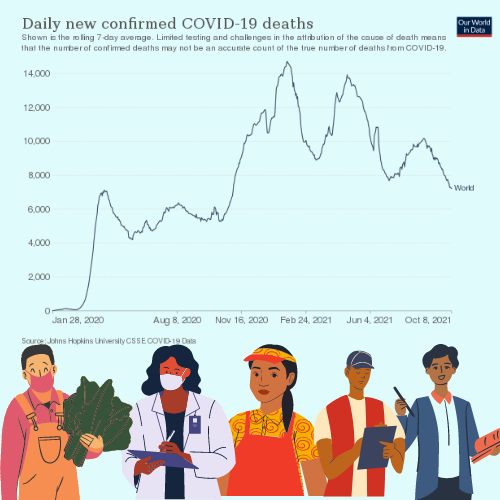
March 2020 has been widely regarded as the calm before the storm.
Schools were closed until further notice, TikTok trends were in their primetime and terms like “social distancing” and “variant” had not yet been introduced into people’s vernacular. As the world is gradually easing back into normalcy, teens are finding themselves growing reminiscent of the early pandemic.
Teens have turned to social media platforms such as TikTok to express their yearning for a more “blissful” time: the early quarantine era. This genre, known as the “early pandemic aesthetic,” has attracted a large online community.
Tiktok user @james_ikin hopped on this trend last October with a compilation of viral TikTok sounds from early quarantine. The video has accumulated over three million views with the top comment reading, “Why do I miss this?! Weirdly nostalgic.”
But was it really so blissful? Are people forgetting the hospital bed shortages, daily COVID-19 death counters and frontline workers’ countless sacrifices?
In the midst of a transitioning stage from a pandemic that wreaked havoc on the entire world back to normalcy, the line between reminiscence and romanticism has been blurred.
In its early stages, the gravity of the pandemic had not yet set in for teens. While they were concocting “whipped coffee” and binge-watching “Tiger King,” other groups were forced to face the harsh reality head-on. This is where the “early pandemic aesthetic” turns problematic.
Essential workers never had the privilege of working from home, even in the peak of the pandemic. Healthcare workers were tasked with keeping people safe amid the apocalyptic reality of COVID-19, risking their lives for COVID-19 patients while continuing care for other medical conditions. Other industries—food, agriculture, education, retail, transportation and delivery—constituted the 34 percent of US adults deemed essential workers.
The romanticization of the pandemic, from the perspective of an oblivious teenager, takes away from essential workers’ invaluable sacrifices.
Junior Karin Fowler has noticed the rising popularity of pandemic nostalgia among her peers. “When people say that they miss quarantine they should think about what that really means. If they were to be put back in that situation, would it truly bring them satisfaction? Thousands of frontline workers caring for the millions sick, teachers scrambling to adapt to virtual instruction, and unemployment rates rising —this was reality in spring 2020,” she stated.
“Thinking about where we were a year and a half ago, the rest of us are doing everything we can to prevent that from ever happening again,” Fowler continued.
But romanticizing the past is nothing new. Nostalgia is the driving force of human emotion, shaping the way people recall past events and the feelings associated with them.
University of Southern California psychology expert David Newman found in a 2019 study that people often lean on nostalgia when they are dissatisfied with their current lives.
In the initial stages of COVID-19, for the first time in years, people were more connected than ever before. The shared experience of an unknown future was unifying, alleviating feelings of isolation and anxiety. Even though people were physically isolated, the pandemic instilled a sense of emotional togetherness: the feeling that no matter what the future held, everyone was in it together.
Deep into the latter part of the pandemic, the hopefulness and unity from the early stages has dissipated. States have been transitioning back to normalcy at different rates. Schools and companies have been eagerly plotting a path forward. And for teens, life has become more complicated again.
As new pandemic challenges arise– reinstitution of mask mandates, new variants and a tense political climate– it is no surprise that people are cherry-picking moments from the life altering event that was COVID-19.
Despite the motives behind this emerging trend, it is time people extended their gratitude towards the workers who managed to care for the entire population during a global pandemic, rather than continue down a path of ignorance.








